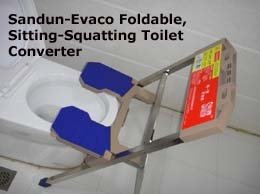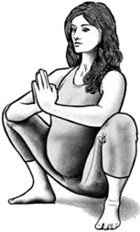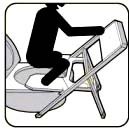|
Toilet Posture & Pregnancy - What Your Obstetrician Won't Tell You
For a woman during her pregnancy, using the correct toileting posture (squatting) is crucial. For it can help protect pregnant women from the risk of a pelvic floor prolapse.
Squatting instead of sitting for bowel movements also provide many health benefits. This is because in the squatting position, waste elimination is easier, quicker and more complete. Moreover, there is no need for straining. The result is a cleaner colon, which provides a healthier environment for both mother and baby. Squatting also help prevent constipation and also hemorrhoids, which can affect up to 50% of all pregnant women (source: aHealthyMe.com). However, the most important benefit of squatting during pregnancy relates to pelvic floor health. By doing away with the need to strain during bowel movements, squatting protects pregnant women against the risk of a pelvic floor prolapse (more details in
Pelvic Floor Prolapse
section). A pregnant woman who squats regularly would also develop the flexibility needed to give birth.
These two videos show how you can improve your ability to squat. (Tip: If you find it difficult to do these exercises, you can do them with your back against a wall, or hold on to a table or back of a chair for support.)
Many obstetricians are totally unaware of the many advantages and benefits of squatting. That is why they do not educate or encourage mothers-to-be to squat for waste evacuation or childbirth. Sadly, the majority of women don't have a choice... Born and raised in a society where only sitting toilets are available, many have lost their natural ability to squat easily, as explained on this page about squatting facets. SIDENOTE
For decades, pregnancy and childbirth educators have always advised pregnant women to avoid the
Valsalva Maneuver.
But with sitting toilets, it is virtually impossible for a woman stop using the Valsalva Maneuver during her pregnancy. In the sitting position, the colon is in the continence mode, and is not properly prepared for waste evacuation. Trying to evacuate waste while sitting on the toilet is like attempting to drive a car with the parking brakes on... In frustration, one has to hold the breath, strain and push downwards with the diaphragm in order to evacuate. Each time one strains, the pelvic floor is forced downwards.
The pelvic floor of a pregnant woman, already bearing the extra weight of the growing baby, is not designed to cope with the additional stress arising from straining for bowel movements. This is the reason why so many women suffer from pelvic floor prolapse (dropping) during their pregnancies. But there is something else. The descent of the pelvic floor can lead to stretch injury of the pudendal nerve, which controls bladder and sexual functions. An injured or damaged pudendal nerve can lead to other complications such as bladder incontinence, lower back pain and reduced sex drive. In truth, the choice of toilets (sitting or squatting) has a great bearing and impact on a woman's health. The connection between sitting toilets, the Valsalva Maneuver and pelvic floor prolapse was highlighted by Ms Rhonda Kotarinos, a renowned physical therapist who has trained physicians at Stanford Medical School in techniques for treating pelvic floor problems. On 28 Aug 2001, Ms Rhonda Kotarinos, in a lecture to members of the Interstitial Cystitis Network, taught that "long-term Valsalva voiding (evacuation) leads to pelvic organ prolapse." Pregnancy should be a time of pride and joy in a woman's life. Yet, for many women today, it has become a harrowing experience, fraught with worry, discomfort and suffering. All because of the sitting toilet. Ms Gurmukh Kaur Khalsa, the internationally renowned yoga, pre-natal and post-natal care teacher, explained why squatting is beneficial for women who are pregnant:
You can read similar views relating to the squatting posture on this page. In addition, you can read the reasons why squatting is also the best position for giving birth in the
Childbirth section.
If you wish to do prepare better for pregnancy and childbirth by changing your toileting posture from sitting to squatting, consider getting a toilet squatting platform or converter.

Book Recommendation
Nature Knows Best is the first and only book on the benefits of using the squatting position for waste elimination. You can also read the specific health problems that are associated with sitting toilets.
Click here to find out more about Nature Knows Best.
Squatting -- My Experience/Story EtcThere is rarely anything as interesting and fascinating than to read about the real-life experiences of others on a topic of shared common interest! You can be sure that many people in the world would love to read about your experience and stories about squatting. Ready, set? Let your words flow! Go from Pregnancy to Home Page
|
The Best Toilet Converter in The World Today!


Helping People All Over
The World Achieve
Good Health Through
Correct Toileting Posture
Watch video on the
origin and story of
the Sandun-Evaco
toilet converter
All about Life,
Hope and Truth...
FREE:
One of the most
astounding books
you will ever read
in your life!











